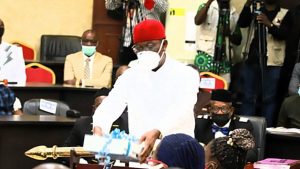By Luther Animashaun
Delta State Governor Ifeanyi Okowa on Thursday presented an Appropriation Bill of N561.82 billion for 2023 to the state’s House of Assembly.
The governor told the lawmakers that the Bill, christened “Budget of Seamless and Stable Transition”, was made up of N326.6 billion for capital expenditure and N235.2 billion for recurrent expenditure.
He said capital expenditure constituted 58 percent of the budget while recurrent expenditure was 42 percent.
Okowa said the allocations were targeted at completing all ongoing projects and new projects in critical areas of needs.
The governor explained that N172 billion, representing 53 percent of the capital budget, was allocated to the economic sector while N70.5 billion was allocated to the social sector. The administration sector got 13.34 billion and regional sector got N64.2 billion.

“Others include N12.4 billion on Health; Education, N42.6 billion; Trade and Investment, N8.6 billion; Sports N8.4 billion; Culture and Tourism, N2.7 billion and Housing, N10 billion,” he said.
The governor said in order to continue tackling unemployment by creating jobs and wealth for Delta State youths, the government has earmarked the sum of N4.3 billion for its model entrepreneurship development programmes, notably STEP, YAGEP, RYSA, GEST, WESAP and ICT Youth Empowerment Programme.
He said the budget, which was derived from the state’s 2023-2025 FSP/MTEF, was anchored on crude oil production benchmark of 1.69 million barrels per day, oil price of $70 per barrel, exchange rate of N435.57 per dollar, National Real Gross Domestic Product (GDP) growth of 3.75 percent, and national inflation rate of 17.16 percent.
“The economy faces headwinds from fiscal instability arising from huge debt overhang, runaway inflation, massive exchange rate depreciation, record-high subsidy costs, high interest rates, insecurity, and food crisis.
“Notwithstanding the persistently challenging external conditions, it is incumbent on the leadership to address the socio-economic needs of our people and ensure that their legitimate aspirations are realised.
“To successfully do that requires that we must be conscious of the decisions we make and guided by the obligation to carefully weigh every available option in the light of our fiscal realities vis-à-vis the demands of good governance,” Okowa said.
Welcoming the governor to the House of Assembly’s chamber earlier, Sheriff Oborevwori, speaker of the House, lauded him for the giant strides recorded by his administration in infrastructure and human capital development since 2015.
Oborevwori, who is the governorship candidate of the People’s Democratic Party (PDP) in the 2023 general elections, said Okowa’s model entrepreneurship development programmes had rescued many youths and women from unemployment and underemployment.
He urged all heads of ministries, departments, and agencies (MDAs) to buckle up for the defence of their budget proposals before the Standing Committees of the House.
The House moved to accept the Appropriation Bill for consideration and also approved a motion slating the second reading of the Bill for November 2, 2022 after earlier adopting the acceptance of the fiscal proposal as its first reading.








